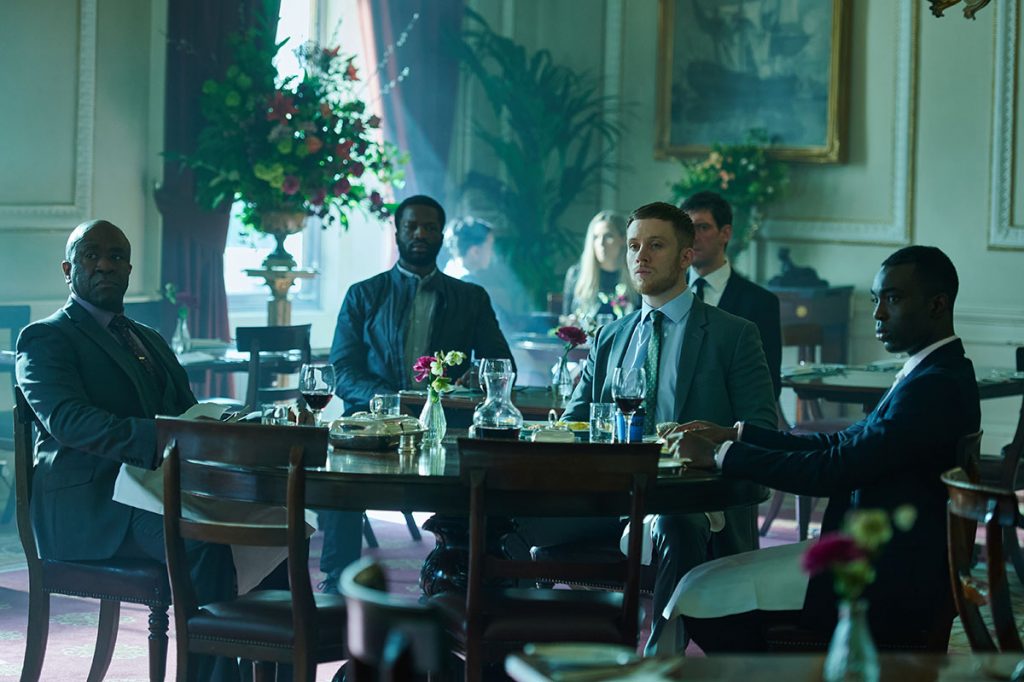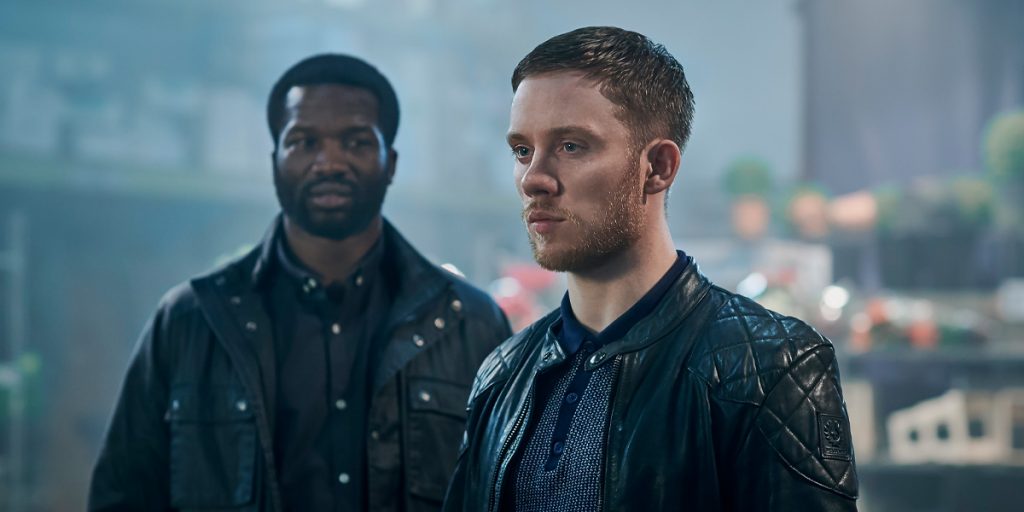Stylish and hyper-violent, Gangs of London is a familiar but fresh-feeling gangster drama series that pulls no punches.
Within the first three minutes, Gangs of London lets you know that it isn’t a show for the squeamish. Created by The Raid’s director/cinematographer duo Gareth Evans and Matt Flannery, an upside down pan along the London skyline opens the first episode, stylishly visualising the shift happening in the city’s underbelly. The camera then flips upright to show two men, one standing on the edge of a skyscraper and the other hanging upside down from it. After a brief back and forth, the hanging man is set on fire, with the camera lingering on his frantic struggle until the rope burns through and sends him plummeting to the ground. As opening scenes go, it’s a bold statement of intent: Gangs of London will not be pulling its punches, literally or figuratively.
The organised crime syndicates of London have been plunged into turmoil after the murder of Finn Wallace (Colm Meaney), head of the Wallace Family and de-facto head honcho of the titular gangs of London. The long held peace between the Wallace family and the wealth of other criminal factions – the Albanian Mafia, Kurdish militants, Pakistani drug ring and Chinese traffickers – hangs by a thread, and so Finn’s volatile eldest son, Sean (Joe Cole), steps into the role in an attempt to restore order and avenge his father’s death. But his competency is doubted by his father’s long-term business partner Ed Dumani (Lucian Msamati, of See How They Run) and his son Alex (Paapa Essiedu, of Genie), who feel they’ve played second fiddle for far too long. Elliot Finch (Sope Dirisu, of Slow Horses), a Wallace family errand boy, is the entry point into this whole embroiled mess, and he soon finds himself risking his life to stand at the shoulder of Sean, trying to protect the familial empire from crumbling.
As a premise, it doesn’t tread any unfamiliar ground, but in its execution, that familiarity lends itself to an accessible means for the tightly wound web of cultures, motivations, narrative threads, scandals and secrets to unfurl over the course of nine episodes. Not every character or story strand is perhaps as developed as they could be, and conversely the show spends more time on certain arcs than others that eventually prove more compelling. But overall, it’s well-paced, well-acted and doses heavy on the action and violence often synonymous with the ‘gangster genre’.

And it’s in these latter two points that the show really shines. Offering up a veritable feast of acting talent, there’s an array of fine performances on display. Cole’s Sean is so desperate to appear stoic, but he can’t help the tightly wound ball of rage, fear and sadness that simmers beneath the surface. Every shifting emotion is visible in the subtle detail of Cole’s face, and his narrative arc feels like a ticking time bomb at times. Michelle Fairley plays Marian, the Wallace family matriarch and widow of Finn, in a key that’s seemingly higher than everyone else around her, but manages to hold back from feeling completely out of place. Orli Shuka and Narges Rashidi play Luan, the leader of the Albanian Mafia, and Lale, a Kurdish militant, respectively, and are perhaps the two stand out performances from so-called ‘side characters’. Their complex backstories unfold through clever exposition that never feels clunky, and it muddies the water when the bad people doing bad things are actually really engaging. Even if they do stretch credulity to its absolute limit at times.
But the most prominent performance is Dirisu, whose Elliot is willing to play the martyr, the bad guy and the mediator. He’s regularly battered and bruised, but remains the central focal point for a show that is constantly running the risk of spiralling off into too many directions. Dirisu is a tremendous screen presence – as evidenced in his lead role in Remi Weekes’ terrific horror His House last year –, and Elliot’s journey from lackey to the echelons of the criminal enterprise is perhaps the show’s most enjoyable arc.
As one might come to expect from the filmmakers behind The Raid’s incredible martial artistry, the violence that’s on offer throughout Gangs of London is quite the spectacle. It’s ferocious, kinetic and effusive in its brutality. Dirisu gives the technically complex fight scenes his best, appearing in two of the show’s stand out sequences in a pub and a grubby tenement flat. Which, uncoincidentally, appear in the two episodes directed by Evans. His – and cinematographer Flannery’s – stylistic flare is most apparent when the show delves into the moments of hyper-violence: quick-cut camerawork getting right in on the action and slowing down when it needs the landing of a (literal and figurative) punch to make as much impact as possible. But when the reigns are handed over to Corin Hardy and Xavier Gens (who direct the remaining seven episodes between them), the shift to more plot- and action-heavy sequences is still recognisable as being part of a cohesive whole, without making Evans’ signature frenetic fights feel gratuitous. Instead, they feel like a true consequence of being steeped in the type of world the show has delved in to.
A really compelling mixture of action, violence, drama and intensity, Gangs of London keeps its recognisable formula feeling fresh. It’s hyper-violent moments won’t be to everyone’s taste, but the show crafted around those wince-inducing sequences is of a high enough calibre that one can excuse having to look away for a few moments.
Gangs of London is available to watch on Digital and on Demand.

